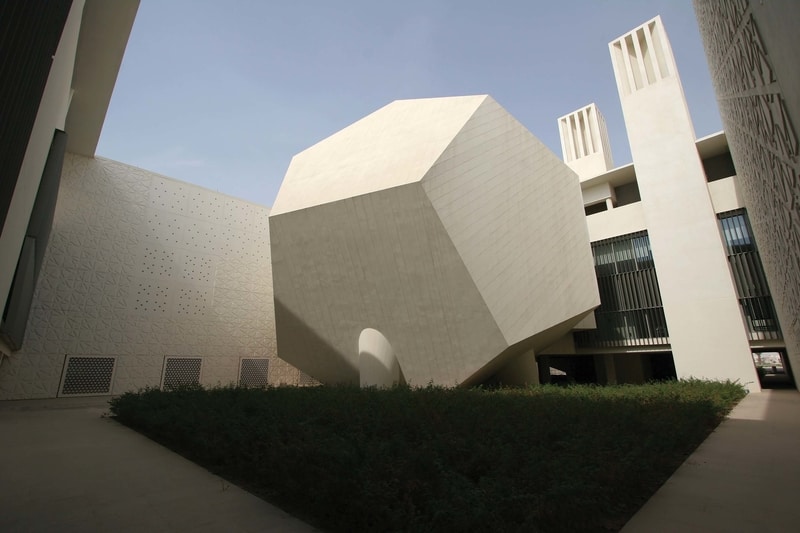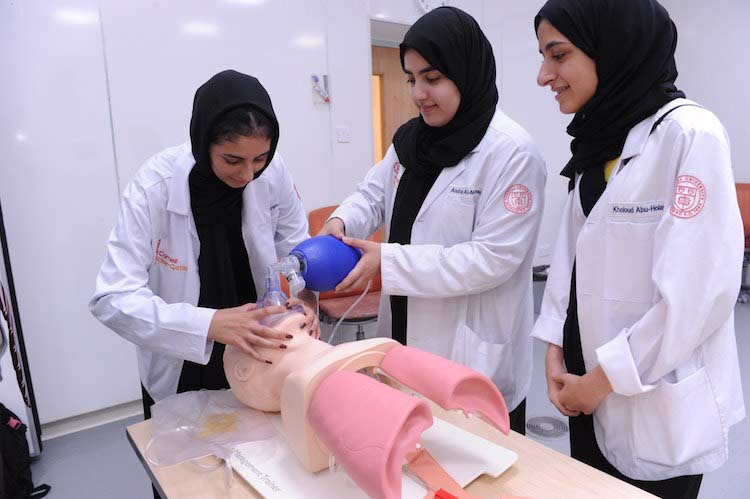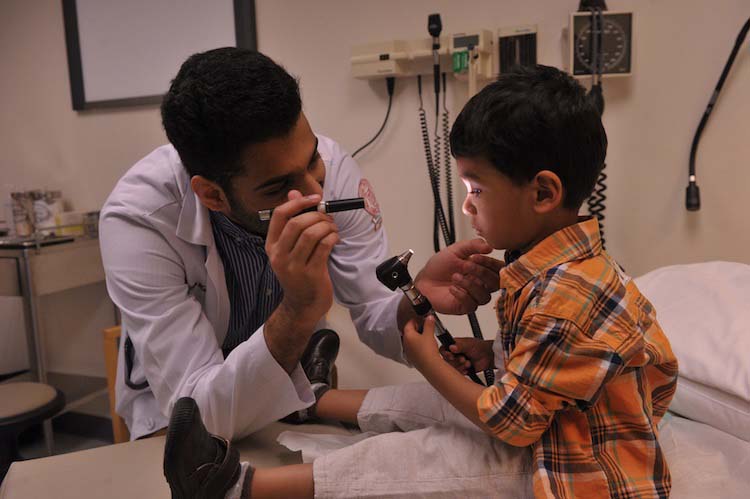Weill Cornell Medicine – Qatar (WCM-Q), the first and leading medical school in Qatar, recently marked 10 years since it first established its Foundation Program, which is a one-year programme intended to be a pathway to entry to the six-year medical programme.
WCM-Q was established by Cornell University in partnership with Qatar Foundation for Education, Science and Community Development, pursuant to an agreement signed in January 2001. WCM-Q is part of Cornell University in Ithaca, New York and shares the tripartite mission of Weill Cornell Medicine in New York: A dedication to excellence in education, patient care and research.
In addition to being the first medical school in Qatar and a pioneer of coeducation at university level, WCM-Q offers an integrated programme of pre-medical and medical studies leading to the Cornell University MD degree. Teaching is by Cornell and Weill Cornell faculty, including physicians at Hamad Medical Corporation (HMC) who hold Weill Cornell appointments.
‘Weill Cornell Medicine is an Ivy League school and holds its students, faculty and staff to truly world-class standards. In order to help prepare talented and motivated local students to achieve those exceptionally high standards, we went into Qatar’s high schools and identified students who were interested in careers in the health professions. We then created the conditions in which they could learn maths, science and English and so be ready for the rigour of the six-year medical programme,’ said Dean of WCM-Q, Dr Javaid Sheikh.
Enrolment has grown rapidly from 25 first year pre-medical students in 2002 to more than 300 students from more than 30 countries in 2018.
‘I knew I wanted to be a part of WCM-Q ever since I was 5 years old in 2004. To me, WCM-Q is what ignited my interest in medicine. As a prospective student, I chose WCM-Q because it provides a unique American MD programme in only six years. I have met the faculty members prior to that in a summer outreach programme and I saw just how passionate, supportive, and experienced they were. In addition, WCM-Q provides the opportunity for clinical research, a field of medicine I am personally interested in,’ said Tala AbuSamaan, a Foundation Program student.
‘I chose WCM-Q because I wanted to get a high-class education while being close to my family. The dynamic of WCM-Q is very interesting as it is a smaller class compared to other medical schools, so we get more attention from the professors. I liked the structure of the school and how we gradually enter medical school. We are prepared through different classroom activities and levels before we get into medical school experience,’ said Dr Ameneh Amini, a WCM-Q graduate, Class of 2017.
The Mission
In 2007, WCM-Q launched the Foundation Program specifically to develop the skills of those from traditional educational backgrounds who are academically gifted but may not be ready for the transition from high school to university. The programme essentially acts as a bridge between high school and university for those wanting to study medicine.
The WCM-Q Foundation Program allows students to study the relevant subjects they will need to help them develop the study skills, habits, critical thinking, and knowledge application to help prepare them for the pre-medical curriculum of the six-year medical programme. The subjects the students study have been specially designed to provide them with an appropriate academic background for their intended degree.
‘Through the Foundation Program, we are also creating additional human capacity within the Qatari healthcare system and helping to graduate Qatari doctors who are working in – and improving – the medical landscape of their home country. They are acting as role models for the younger generation and contributing to the dissemination of best medical practice, so adding to Qatar’s ever-expanding knowledge economy,’ said Dr Sheikh.
‘We have designed the Foundation Program to develop students’ natural curiosity, to make them resilient, to help them develop their work ethic, and to encourage their creativity and deep, critical thought so that they can advance to higher levels of intellectual achievement. When these qualities are instilled, not only do students become extremely effective at gaining knowledge, but they also gain the ability to apply that knowledge to novel situations, which is essential for their future success, both as students in the Medical Program and as future doctors,’ said Assistant Dean, Dr Rachid Bendriss.
The Structure
The Foundation Program consists of courses intended for students who recently completed high school. Enrolled students must successfully complete all academic courses per semester to complete the programme. All courses involve ongoing assessment and end-of-term examinations. ‘The purpose is to ensure that foundation students have the necessary skills to achieve success in the pre-medical and medical curricula. To ensure it happens, Foundation Program faculty also teach the pre-medical syllabus, and the foundation curriculum itself is integrated to ensure a seamless transition between the years,’ said Dr Bendriss.
According to him, in small classes, and with access to Cornell laboratories and resources, students in the programme study basic science subjects required in the pre-medical curriculum in addition to extensive English as a Second Language (ESL) courses. This gives students the opportunity to focus on their primary area of study and prepare them for future study in their chosen field. Students also take a global health and disease course and special studies in biology.
‘The Foundation Program introduced us academically to the hardships of the sciences. Allowing us to know the extent of knowledge expected, it was easier for some of us to divert their career paths. Personally, it provided a perfect suspenseful stimulus to keep discovering the obscurities of medicine. We were also introduced to clinical observation early on which in turns narrowed down our potential future specialities and enlightened us with the professional ways of handling patients. Lab dissections also provided an early hands-on experience with dissection equipment and cadavers, which also demonstrates what we learn on paper in three dimensions,’ explained AbuSamaan.
Combined with co-curricular and leadership activities such as field trips, faculty mentorship, theatre productions, and distinguished guest lectures, the students complete the Foundation Program with the skill sets required for WCM-Q’s Medical Program.
‘The Foundation Program didn’t only prepare me in terms of the academic aspect. It also solidified my interest in medicine as we are involved in different activities and inspired us toward our choices in medicine. You grow up knowing what you want,’ said Dr Amini.
The Future
According to Dr Bendriss, the Foundation Program will evolve and thrive through implementing innovative teaching approaches and curricular initiatives. ‘This year for the first time, students in the Foundation Program earn college credit for their courses. They also take premedical courses, such as Global Health & Disease and are exposed early to the medical profession through observerships and experiential learning at our affiliate institutions. They are also inspired by our guest distinguished leaders and alumni in the weekly Medical Career Seminar, which contributes to their early professional identity formation. The Foundation Program also continues to provide students the opportunity to participate in our summer programme in Ithaca to experience college life in the home campus,’ he said.
There are currently 22 students in the 2017/18 Foundation Program, the vast majority of whom are Qatari.
After successfully completing the Foundation Program, students are promoted to the WCM-Q Six-Year Integrated Medical Program.
For more information on WCM-Q, visit qatar-weill.cornell.edu.
Author: Ola Diab
Copyright © Marhaba Information Guide. Reproduction of material from Marhaba Information Guide’s book or website without written permission is strictly prohibited. Using Marhaba Information Guide’s material without authorisation constitutes as plagiarism as well as copyright infringement.














